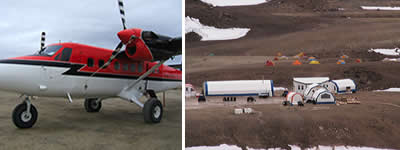Supply Chain Analogies

A vast number of scientific principles and techniques have been developed since World-War-II to improve the effectiveness and efficiency of terrestrial supply-chains in the private and military sectors. We are investigating and contrast lessons learned from SCM in (i) major industries, (ii) long-range military operations such as naval-submarine logistics, and (iii) supply-chains for operations in remote environments (e.g., The Arctic).
Exploration Operations in Remote Environments
There are examples where effective logistics architectures and supply chain management have directly benefited or even enabled exploration. Our investigations will focus on two terrestrial exploration scenarios in particular:
- Exploration of the Arctic: The history of Arctic exploration provides valuable lessons for space system designers. From its inception Arctic exploration and science shared many attributes and constraints with current space activities. Both, for example, have been highly dependant upon technological advances, including the need for complex logistics and cutting-edge life-support capabilities.
- Off-Shore Oil and Gas Exploration: Supply chains are also critical to support exploration for oil, natural gas and other resources on Earth. These activities occur at remote sites such as oil rigs and platforms in developing regions. These pose formidable supply chain challenges. MIT has developed strategies for these situations, e.g. for British Petroleum (BP), and we are bringing to bear this body of knowledge in this project.
Commercial Terrestrial Supply Chains
Our analysis of commercial supply chains on Earth will focus on situations where small quantities are involved, large capital investments are required and efficient sparing strategies with uncertainties are sought. Recent methodological advances have been made for bi-level and multi-level sparing and resupply problems under uncertainty with a variety of service and budgetary constraints. We have developed powerful models and mathematical techniques and programs to solve such problems on Earth, and we propose to extend them to interplanetary SCM. Our team is very familiar with both theoretical and practical aspects of successful terrestrial supply chains, and it is our plan to infuse this knowledge in this project.
Long-Range Military Supply Chains
It is was well known, even before World War II, that the success of military campaigns depends crucially on the proper functioning of resupply routes for ammunition, food and spare equipment to frontline troops. With the introduction of long-range military transport aircraft and naval vessels these logistics capabilities have grown steadily. Nevertheless, there are a number of especially challenging aspects of military supply chains that have potential application to space exploration:
- Aircraft carrier and submarine logistics: We are investigating logistics strategies for carrier-based aircraft (e.g. F/A-18) and submarines (e.g. SSN-688). This analysis will focus on the classification of classes of supply, the choice of transportation modes, overall optimization and scheduling as well as ways in which forward supply points are used for pre-positioning. Another part of the analysis of analogies for space exploration will center on the appropriateness of the three echelon system of organizational- (O), intermediate- (I), and depot- (D) level maintenance and repair for space exploration.
- The U.S. Air Force, over the last two decades, has realized that not all parts of logistics architectures can be treated uniformly. Planning assumptions that apply to consumables or high volume items are often inappropriate for low demand, but critical, items. For critical items affecting availability rates, dedicated, rapid-response transportation modes have become an important part of military supply chain management. We are examining these analogies and relevance for NASA's space exploration initiative, starting with the work done by Pankonin and Peterson.
Lessons Learned from Human Spaceflight Logistics
We believe it is important to document and learn from the past. As part of this task we have investigated lessons learned from both ISS and STS space logistics. To the extent possible, this also included a look at the Apollo Program logistics (1962-1975) as well as Skylab, MIR and other related programs.
The lessons learned are captured in the following report (PDF):
